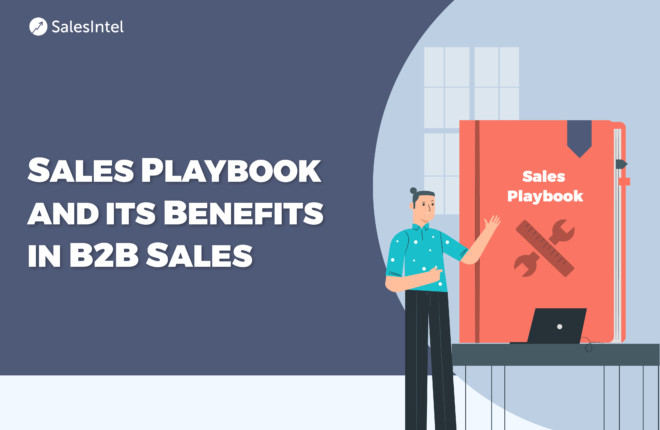Many sports teams use a playbook to map out possible in-game scenarios, outlining the team’s strategy, tricks for avoiding typical stumbling blocks, and recommendations for achieving goals efficiently. Meanwhile, a B2B sales playbook can assist sales teams in developing methodical winning habits and methods.
A well-written sales playbook not only streamlines the entire sales process but also allows your team to better handle a variety of sales situations while delivering a value proposition to each potential client.
What Is a B2B Sales Playbook?
A sales playbook is a collection of resources that helps your team establish its sales process and methodology, outline sales targets, and provide a framework for closing sales. You can also call it a sales strategy playbook.
A B2B sales playbook back in 2000 might have been a collection of documents bound in a binder that sits on a high shelf in a training room. However, today the millennials who are entering the workforce learn best from watching videos and expect to be able to use their smartphones to access training materials.
As a result, today’s typical B2B sales playbook is likely to be hosted on the cloud and handled internally. However, some companies can assist you in refining your processes and developing sales playbooks.
Why Sales Playbooks Are Crucial for B2B Sales Professionals
A sales playbook, in general, puts the correct strategy and tools at salespeople’s fingertips so they can take the right steps, at the right time, with the right people.
According to HubSpot reports, salespeople spend only a third of their day talking to prospects.
Writing emails (21%), entering data (17%), and prospecting or investigating leads take up the rest of the time (17%).
In the sales process, salespeople waste time by:
- Awaiting the advice or consent of a sales manager
- Searching for proper materials
- Customizing or creating resources
- Trying to figure out the best course of action or the next best move for each unique situation they come across.
Longer sales cycles, inconsistency, generic tactics, and poorer closure rates result from poor sales management.
The use of a sales enablement playbook yields results. It enables your salespeople to perform better and faster, resulting in more leads becoming customers. This is the key to boosting new business income and conversion rates overall.
4 primary benefits of a sales playbook:
1. You can Spend More Time Selling
Salespeople are obliged to produce their own material if they are left to their own devices. According to Salesforce, one-third of a salesperson’s day is spent looking for or creating content. Include ready-made messages, questions, and resources in your playbook to avoid this happening in your company.
2. Quick and Easy Training for New Sales Members
The most expensive period for your firm is the key three to six months of ramping up a new employee. Due to a lack of adequate training, new sales employees are forced to learn on the job–usually by following other reps who may be teaching incorrectly.
3. Successful Smarketing
Many businesses struggle to find common ground between sales and marketing. Instead of fighting, you can make your two revenue-generating teams work together toward common organizational goals by documenting your sales process and examining who is responsible for what.
4. Spread Best Practices from Top-Performing Sellers
If one of your reps finds success with a new outreach strategy, study their strategies and share the information with the rest of your team by including it in the playbook.
An ideal sales playbook provides a thorough list of techniques and methods for each member of your sales team. To that end, the playbook should establish clear objectives, provide measuring criteria, and establish a uniform framework for approaching and closing sales. After completing this playbook, your team will have the tactical guidance they need to minimize risk areas, resolve sales process vulnerabilities, and ultimately increase the win/loss ratio (for both individuals and the entire sales division).
How Do You Make and Use a Sales Playbook?
Before you can build and apply your sales playbook, you must first realize the greatest risk connected with it: making your sales associates sound like they’re reading from a script. To put it another way, your salespeople should be consistent, but they should never sound robotic.
#1. Create an actionable and user-friendly playbook.
Nobody wants to search the entire dictionary for a single word. And, no one wants to read an entire sales encyclopedia just to grasp one topic. In this sense, the more concise your playbook can be, the better. This isn’t to indicate that you should skip on content for the sake of brevity. Rather, make the language clear and straightforward. In addition, your playbook should be simple to refer to. Label each area with a clear description of who it is for, such as global teams, new hires, or regional teams.
#2. Establish a clear goal for your sales playbook.
Your company’s sales playbook should be adapted to your organization’s needs, as I mentioned before in this essay, but it’s so vital that I’ll say it again. Sales playbooks aren’t interchangeable; they’re tailored to your company’s individual sales strategies. With this in mind, your sales strategy should be in line with your company’s mission to reach a certain goal. Simply stating that you wish to “raise sales” is insufficiently clear. Instead, your sales strategy can be to focus on establishing a consistent customer-centric process or improving the customer experience from beginning to end with more meaningful touchpoints.
#3. Use redundant and accurate metrics to assess the playbooks and your team’s success.
If you don’t have the accurate B2B data and metrics to back up the strategies in your sales playbook, they’re useless. These indicators can also be utilized to identify a defined end state and the success of your team. After all, just because your salespeople are reading the playbook doesn’t imply it’s assisting them in providing a better customer experience throughout the buyer’s journey. To address this, you should keep track of how the playbook is used. What sections, for example, are leading to the best results across the team?
Client preferences and behaviors shift over time, just as your products or areas do. To deliver the most accurate and valuable information to your sales team, make sure your playbook is dynamic, adaptive, and ready to evolve to meet changing corporate and customer needs.
Boost the Effectiveness of Your B2B Sales Playbook
Crafting a 21st-century sales playbook is more akin to writing a “choose-your-own-adventure” novel than a linear script. You want your playbook to inspire your teams to think beyond the box. Given that, you can write the best sales playbook ever written, but if your team doesn’t use it, it’s pointless. Allow your entire staff to access it at any time; make it available online.
Building a sales playbook is a large task, but it’s well worth your time and effort.





